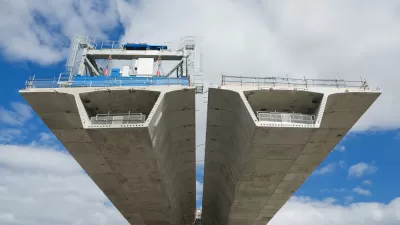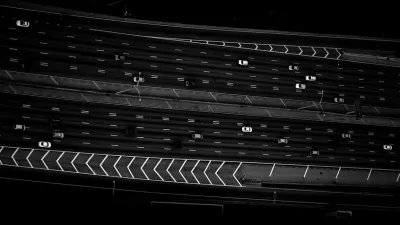Giving new meaning to the phrase "take back the streets," Neal Peirce writes about the arguments in favor of a "freeway free" future for the world's cities, which was the subject of a recent Rockefeller Foundation Conference held in Bellagio, Italy.
There has been a lot of buzz around freeway removals lately, as more and more cities begin to contemplate more efficient land uses. Peirce states that although freeways were designed to alleviate traffic congestion on streets, they instead "encourage more auto use and end up triggering some of the most massive traffic snarls known to humanity." Furthermore, "freeway-free" advocates such as former Bogota Mayor Enrique Peñalosa, point out that "limited-access superroads, with extraordinarily high construction costs, soak up public revenue that could go into schools, housing, libraries and public health to improve the lives of millions of families scraping by at subsistence levels."
Instead of depending on these massive pieces of infrastructure, Peirce says, planners should rethink how streets and automobiles are used, and look to cities like Milwaukee, San Francisco and Seoul, who have done away with major freeways, for inspiration.
Another "freeway-free" theorist, architect and planner Peter Calthorpe, suggests "that freeway-free cities could be planned with a broad network of car-less avenues, each offering generous space for walking, biking and exclusive bus lanes, an environment perfect for apartments and shops. Each such avenue would be separated a few hundred yards in each direction from parallel one-way streets that accommodate cars and trucks."
A major benefit of this "freeway-free" vision of a city, as U.N.-Habitat Director Joan Clos claims, is the adoption of more sustainable and efficient development that will deter sprawl while accommodating expanding populations in major world cities.
FULL STORY: A ‘Freeway-Free’ Future for World Cities?

Maui's Vacation Rental Debate Turns Ugly
Verbal attacks, misinformation campaigns and fistfights plague a high-stakes debate to convert thousands of vacation rentals into long-term housing.

Planetizen Federal Action Tracker
A weekly monitor of how Trump’s orders and actions are impacting planners and planning in America.

Chicago’s Ghost Rails
Just beneath the surface of the modern city lie the remnants of its expansive early 20th-century streetcar system.

Bend, Oregon Zoning Reforms Prioritize Small-Scale Housing
The city altered its zoning code to allow multi-family housing and eliminated parking mandates citywide.

Amtrak Cutting Jobs, Funding to High-Speed Rail
The agency plans to cut 10 percent of its workforce and has confirmed it will not fund new high-speed rail projects.

LA Denies Basic Services to Unhoused Residents
The city has repeatedly failed to respond to requests for trash pickup at encampment sites, and eliminated a program that provided mobile showers and toilets.
Urban Design for Planners 1: Software Tools
This six-course series explores essential urban design concepts using open source software and equips planners with the tools they need to participate fully in the urban design process.
Planning for Universal Design
Learn the tools for implementing Universal Design in planning regulations.
planning NEXT
Appalachian Highlands Housing Partners
Mpact (founded as Rail~Volution)
City of Camden Redevelopment Agency
City of Astoria
City of Portland
City of Laramie




























